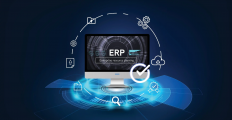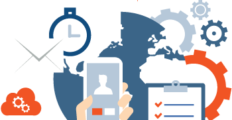Enterprise Resource Planning or ERP is the precursor of data integration between different departments in the growing organizations. The times are gone when we kept data in silos, and the current trends are to make the data work for you using enterprise resource planning or ERP technology. Do you know that the ERP market is in its glooming expansion phase, with the total market size expected to increase by $49.5 billion by 2025?
Any business planning to expand its sales and marketing reach can trust the power of ERP. Let us understand all about Enterprise Resource Planning in detail, including definition, different types, understanding its working, top features, and advantages. Let us start with a brief description first.

What is ERP?
The ERP or Enterprise Resource Planning is the modern software that uses a central database, offers insights into internal controls, and automates the business processes. It helps different departments streamline the data from manufacturing, sales, human resources, marketing, supply chain management, accounting, etc.
You can tailor ERP solutions according to business needs. It unifies different business functions, ensures time and cost savings, and brings the best automation to processes. The ERP deployment defines the utilization process of ERP at any business. Let us try to understand different types of ERP.
Different types of ERP deployment models:
The five different types of ERP deployment models include:
- On-premise ERP, where the software runs on company servers and is the dedicated responsibility of the company.
- Cloud-based ERP that uses remote servers maintained by other service providers.
- Open-source ERP comes as an inexpensive alternative for ERP solutions.
- Hybrid ERP is the combination of on-premise and cloud-based ERP.
- Single-tenant ERP is a separate single-tenant instance of ERP.
How does ERP work?
ERP software is backed by standard and defined data structures. The uniform data entries are shared across different department users for quick decision-making. This allows seamless integration of sales, marketing, finance, project management, HR, customer services, etc., at one platform.
Hence, the need for the different ERP modules for various departments is justified when every team can handle the data management for effective decision making. The different integrations utilize data management and offer visible results to stakeholders for quick decision-making.

Features of ERP
Any ERP system should have the following features to make it a success for any business:
- Consistent UI/UX for ultimate customer experiences
- Automation features for matching the competition
- Common database for different departments
- Data analytics for informed decision making
- Business process integration for seamless workflows.
Advantages of ERP
Some of the key benefits of ERP software include:
- Visual workflows: ERP allows quick access to the current status and performance of the different workflows.
- Business insights: All the robust trends in data management can drive the necessary business intelligence for any business.
- Risk management: The defined approvals and minute access controls reduce and manage the risks for any business process.
- Effective collaborations: Bringing different internal departments, stakeholders, vendors, and customers on the same page is the first step towards effective collaboration by ERP solutions.
- Flexibility: ERP technology is flexible for specific features and crucial workflows for any business.
- Partner and customer management: There is no need to use different tools when a single ERP platform can do justice to partner and customer management.
- Saves cost: It saves money for the business in different ways, including cross-company visibility, minimizing errors, using unified communication channels, etc.
- Detailed analytics: ERP is helping multiple businesses derive the key analytics based on the KPI tracking and data analysis.
- Regulatory compliances: There are reduced chances of errors and increased adherence to different regulatory compliances when using ERP solutions.
- Data security: The critical security protocols ensure that only the allowed members have access to crucial information on the ERP system.
- Scalability: ERP technology is meant to be flexible and scalable to accommodate the changing needs of growing and established businesses.
- Customization: Businesses can unleash the power of ERP with high levels of customization based on specific business needs.
Who can use ERP?
There is no need to worry about using ERP software for your business as multiple businesses already utilize it across different business verticals. ERP is used mainly in the following industries:
- Apparels
- Footwear
- Accessories
- Consulting
- Energy
- Food and beverages
- Retail
- Wholesale distribution
- Healthcare and life sciences
- Manufacturing
- Non-profit companies
- Restaurants and hospitality
- Software and technology
- Media and publishing
- Advertising and digital media
- Campus stores
- Professional services
- Education
- Financial services
- Health and beauty
- IT services
- Transportation and logistics
Common ERP Modules
ERP modules come in different modules that serve the automation needs of various departments. These modules are connected to the centralized ERP system that offers a platform for shared information across different systems. The standard nine ERP modules used in modern businesses are:
-
Human Resource Management
The HR module offers multiple human resources features like payroll management, time management, attendance management, etc. In addition, companies can deliver robust HR functionality by adding features such as human capital management (HCM) suites and applicant tracking system to the existing ERP. HRM module hence can manage employee experience management and workforce analytics. An Applicant Tracking System allows recruiting staff to collaborate and share data while screening candidates, both internally and with other departments or external recruiters.
-
Sales
The dedicated ERP module for sales establishes seamless communication with customers and prospects. Some of the sales ERP module features include sales force support, sales performance management, billing management, contracts management, order management, order-to-cash process management, targeting leads with the right promotions, upselling opportunities, and data-driven insights to increase sales, etc.
-
Logistics and Supply Chain Management
The logistics and supply chain management’s dedicated ERP module tracks the supplies and good movement throughout the company’s defined supply chain. The logistics and supply chain management module ERP increases the resilience and supply chain visibility with critical features like logistics management, transportation management, warehousing operations management, real-time inventory management, etc.
-
R&D and Engineering
An ERP module customized to handle R&D and engineering helps businesses focus on innovations by reducing the costs involved and decreasing the time for administrative work. The R&D and Engineering ERP module offers product compliance management, product lifecycle management (PLM), product design and development management, etc.
-
Finance
The finance and accounting software is one of the widely used modules. Some of the features of finance ERP include mitigating financial risks, complying with revenue recognition standards, generating financial reports, efficient book closing, tracking accounts payables (AP), accounts receivables (AR), automating financial tasks, managing general ledger, etc.
-
Sourcing and Procurement
The dedicated ERP module for sourcing and procurement helps businesses procure materials or services required to manufacture goods or items needed for reselling. The sourcing and procurement ERP module can handle different functions like approvals, contracts creation, requests for quotes, seamless connection with buyer networks, improves supplier negotiations with AI-powered analytics, minimizes overbuying, underbuying, centralized, and automated purchasing, etc.
-
Manufacturing
Manufacturing needs a planning and execution module of ERP. Some of the features of the manufacturing module of ERP include quality management, manufacturing execution, production scheduling, materials requirements planning (MRP), etc. All these features ensure that production is in line with the demand and simplify complex manufacturing processes.
-
Enterprise Asset Management
Companies with significant assets need to keep their machines running at total efficiencies while reducing downtime. That’s where asset management ERP modules come into the picture. Some of the key features of the Enterprise Asset Management (EAM) module of ERP is the Environment, Health, and Safety (EHS) management, assets operations, assets planning management, assets scheduling, predictive management, etc.
-
Services
The services module of ERP delivers personalized and reliable customer service to multiple business customers. Some of the key features of the services module of ERP include service-based revenue streams, field service management, spare parts management, in-house repairs management, etc. In addition, it helps improve loyalty and ensures that service technicians can quickly solve customer issues with detailed analytics.
Costs of ERP
The total costs of ERP software depend on the features, vendors, and different deployment models. However, the total prices of cloud-based ERP solutions are way less than the on-premise ERP solutions. This is due to the reduced costs of purchasing hardware or other systems that come as a SaaS model in cloud-based ERP technology.
The total costs of an ERP system include licensing, implementation, customization, maintenance training, upgrades, and support requirements. The licensing costs are on-time for the on-premise ERP while it runs on-demand for cloud ERP technology. The average costs of ERP at your business range from $10,000 to a couple of million dollars annually for different businesses. It is important to have a GKE cost optimization system for your engineering teams with increasing cloud costs.
Wrapping Up
With the global ERP software market expected to cross $78.4 billion by 2026, businesses need to understand ERP software. It is a dedicated application that automates different business processes and offers a central database to different teams. The different types of ERP include cloud and on-premises versions based on business needs.
It is easy to understand the working of ERP followed by the top industries that are using the ERP solutions. The quick success stories of Oracle ERP from the leading sectors reveal that ERP can be an immediate hit for any existing business.






















Excellent breakdown of ERP! The article clearly explains its purpose, benefits, and real-world applications—perfect for both beginners and professionals seeking clarity.
Leave a comment!